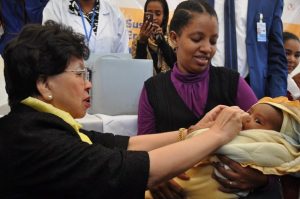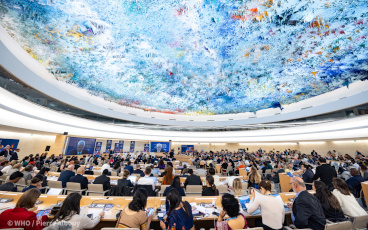Sustaining Progress Against Polio in Ethiopia
A high-level visit to Selam Health Centre in Addis Ababa this month marked continuing commitment to keeping Ethiopia polio-free

On 14 July, 18 months since the last reported case of wild type polio virus in Ethiopia, Dr Margaret Chan, the Director-General of the World Health Organization, Ethiopian Minister of Health Dr Kesetebirhan Admasu, The Global Alliance for Vaccines and Immunization (GAVI) Chief Executive Officer Dr Seth Berkley and UNICEF Deputy Executive Director Ms Yoka Brandt participated in a polio vaccination event at Selam Health Centre in Addis Ababa. Committing the continues support of the GPEI partnership to keeping Ethiopia polio-free, Dr Chan encouraged Horn of Africa countries to “… continue to immunize all at-risk age groups until the threat drops to zero and eradication is achieved.”
In 2013, the Horn of Africa suffered a major outbreak of poliovirus. The outbreak’s epicentre was in Mogadishu, Somalia, and spread to neighbouring Kenya and Ethiopia. The outbreak was fuelled by a combination of low vaccination coverage, frequent population movement and regional insecurity: at the time, over 1 million children in the region were not vaccinated against polio. Over the course of the outbreak, 223 children were left paralysed.
The outbreak in Ethiopia was successfully stopped thanks to the quick actions of the Government of Ethiopia. In partnership with WHO, Rotary International, UNICEF, USAID and the US Centres for Disease Control and Prevention, the Government of Ethiopia launched mass immunization campaigns, encouraged vigilance and intensified surveillance, a crucial aspect of ending any outbreak. Within the space of a few months, fifteen supplementary immunization campaigns were implemented, particularly concentrated on high risk and hard-to-access areas.
Ethiopia has come a long way in the last 18 months. With eradication in sight, it is more important now than ever that complacency does not undermine the momentum attained thus far. Vigilance is essential. Transmission of the virus continues in Pakistan and Afghanistan, and gaps in immunity remain in the Horn of Africa leaving children vulnerable. Only when polio is eradicated entirely from all countries worldwide will all children be safe from this disease for good.













